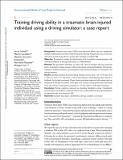| dc.contributor.author | Imhoff, Sarah | |
| dc.contributor.author | Germain-Robitaille, Mathieu | |
| dc.contributor.author | Teasdale, Normand | |
| dc.contributor.author | Fait, Philippe | |
| dc.contributor.author | Lavalliere, Martin | |
| dc.date.accessioned | 2017-06-15T18:42:36Z | |
| dc.date.available | 2017-06-15T18:42:36Z | |
| dc.date.issued | 2017-02 | |
| dc.date.submitted | 2016-08 | |
| dc.identifier.issn | 1179-142X | |
| dc.identifier.uri | http://hdl.handle.net/1721.1/109905 | |
| dc.description.abstract | Background: Traumatic brain injury (TBI) causes functional deficits that may significantly interfere with numerous activities of daily living such as driving. We report the case of a 20-year-old woman having lost her driver’s license after sustaining a moderate TBI.
Objective: We aimed to evaluate the effectiveness of an in-simulator training program with automated feedback on driving performance in a TBI individual.
Methods: The participant underwent an initial and a final in-simulator driving assessment and 11 in-simulator training sessions with driving-specific automated feedbacks. Driving performance (simulation duration, speed regulation and lateral positioning) was measured in the driving simulator.
Results: Speeding duration decreased during training sessions from 1.50 ± 0.80 min (4.16 ± 2.22%) to 0.45 ± 0.15 min (0.44 ± 0.42%) but returned to initial duration after removal of feedbacks for the final assessment. Proper lateral positioning improved with training and was maintained at the final assessment. Time spent in an incorrect lateral position decreased from 18.85 min (53.61%) in the initial assessment to 1.51 min (4.64%) on the final assessment.
Conclusion: Driving simulators represent an interesting therapeutic avenue. Considerable research efforts are needed to confirm the effectiveness of this method for driving rehabilitation of individuals who have sustained a TBI. | en_US |
| dc.language.iso | en_US | |
| dc.publisher | Dove Medical Press | en_US |
| dc.relation.isversionof | http://dx.doi.org/10.2147/imcrj.s120918 | en_US |
| dc.rights | Creative Commons Attribution-NonCommercial 3.0 Unported | en_US |
| dc.rights.uri | https://creativecommons.org/licenses/by-nc/3.0/ | en_US |
| dc.source | Dove Medical Press | en_US |
| dc.title | Training driving ability in a traumatic brain-injured individual using a driving simulator: a case report | en_US |
| dc.type | Article | en_US |
| dc.identifier.citation | Imhoff, Sarah; Lavallière, Martin; Germain-Robitaille, Mathieu; Teasdale, Normand and Fait, Philippe. “Training Driving Ability in a Traumatic Brain-Injured Individual Using a Driving Simulator: a Case Report.” International Medical Case Reports Journal Volume 10 (February 2017): 41–45 © 2017 Imhoff et al | en_US |
| dc.contributor.department | AgeLab (Massachusetts Institute of Technology) | en_US |
| dc.contributor.mitauthor | Lavalliere, Martin | |
| dc.relation.journal | International Medical Case Reports Journal | en_US |
| dc.eprint.version | Final published version | en_US |
| dc.type.uri | http://purl.org/eprint/type/JournalArticle | en_US |
| eprint.status | http://purl.org/eprint/status/PeerReviewed | en_US |
| dspace.orderedauthors | Imhoff, Sarah; Lavallière, Martin; Germain-Robitaille, Mathieu; Teasdale, Normand; Fait, Philippe | en_US |
| dspace.embargo.terms | N | en_US |
| mit.license | PUBLISHER_CC | en_US |
